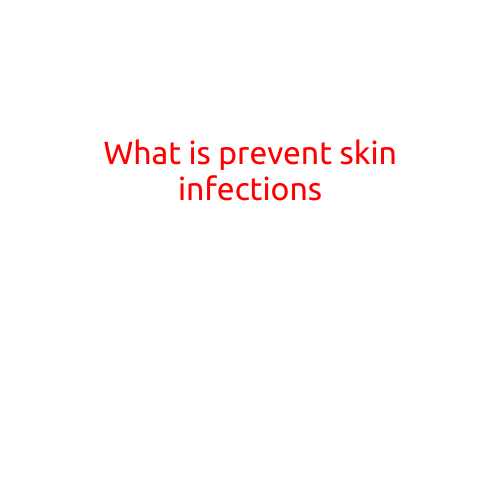
What is Prevent Skin Infections?
Skin infections are a common and unpleasant condition that can occur when bacteria, viruses, or fungi enter the skin and cause an infection. These infections can cause redness, swelling, itching, and pain, and can range in severity from mild to severe. In severe cases, skin infections can lead to complications such as scarring, infections of the bloodstream or organs, and even death.
Fortunately, there are many ways to prevent skin infections and reduce the risk of developing them. In this article, we will discuss the common causes of skin infections, the risks factors, and the ways to prevent skin infections.
Common Causes of Skin Infections
Skin infections can be caused by a variety of factors, including:
- Damaged skin: Cuts, scrapes, and abrasions can provide an entry point for bacteria, viruses, and fungi to enter the skin and cause an infection.
- Poor hygiene: Not washing the skin regularly, especially after exercising or sweating, can allow skin infections to develop.
- Weakened immune system: People with weakened immune systems, such as those with chronic illnesses or taking immunosuppressive medication, are at higher risk of developing skin infections.
- Fungal or bacterial overgrowth: Overgrowth of fungi or bacteria on the skin can lead to skin infections.
- Improper wound care: Not properly cleaning and covering wounds can allow bacteria to enter the skin and cause an infection.
Risks Factors for Skin Infections
Certain individuals are at higher risk of developing skin infections, including:
- Aging: Older adults are more prone to developing skin infections due to weakened immune systems and other health conditions.
- Weakened immune system: People with chronic illnesses, such as diabetes, cancer, or HIV/AIDS, or those taking immunosuppressive medication are at higher risk of developing skin infections.
- History of skin infections: Individuals with a history of skin infections are more likely to develop future infections.
- Poor hygiene: Not washing the skin regularly or not showering after exercising can increase the risk of developing skin infections.
- Trauma: People who have experienced trauma, such as surgery or burns, are more prone to developing skin infections.
Ways to Prevent Skin Infections
Fortunately, there are many ways to prevent skin infections and reduce the risk of developing them. Here are some of the most effective ways to prevent skin infections:
- Practice good hygiene: Wash your hands regularly, especially after using the bathroom, before and after handling food, and after being in contact with others.
- Shower regularly: Showering regularly, especially after exercising or sweating, can help prevent skin infections.
- Keep wounds clean and covered: Keep wounds clean and covered with bandages to prevent bacteria from entering the skin and causing an infection.
- Use antiseptic cleansers: Use antiseptic cleansers to clean wounds and prevent infection.
- Avoid sharing personal care items: Avoid sharing personal care items, such as towels, razors, and makeup, to prevent the spread of skin infections.
- Keep the skin moisturized: Keeping the skin moisturized can help prevent dry skin and reduce the risk of developing skin infections.
- Get vaccinated: Getting vaccinated against certain skin infections, such as varicella (chickenpox) and herpes simplex, can help prevent skin infections.
- Wear protective clothing: Wearing protective clothing, such as gloves and masks, can help prevent skin infections when working with patients or animals.
Conclusion
Skin infections are a common and unpleasant condition that can cause significant discomfort and even lead to serious complications. By understanding the common causes of skin infections, the risks factors, and the ways to prevent skin infections, individuals can take steps to reduce the risk of developing skin infections and enjoy healthier, happier skin.





